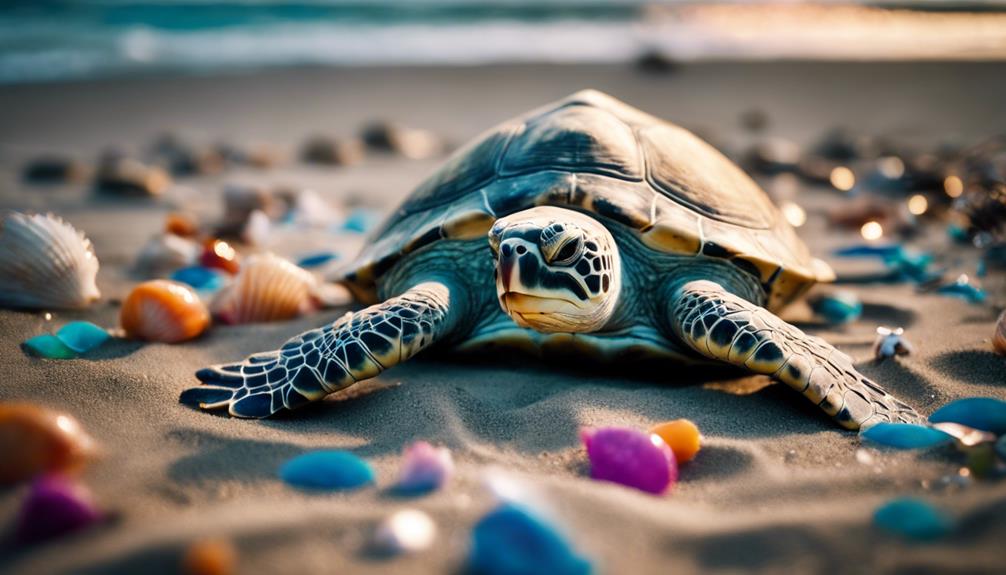Tragically, a recent outbreak of chelonitoxism in Zanzibar resulted in the deaths of 8 children and 1 adult, underscoring the deadly consequences of consuming sea turtle meat, a delicacy that poses significant health risks due to its toxicity. The National Institutes of Health warns against sea turtle meat consumption, citing the risk of chelonitoxism, a severe condition that can lead to organ failure. Despite authorities' warnings and bans, the lack of awareness and compliance with safety regulations has led to devastating consequences. As the crisis in Zanzibar unfolds, it becomes clear that public awareness and adherence to safety measures are vital in preventing further tragedies.
Key Takeaways
• In Zanzibar, consuming sea turtle meat can lead to chelonitoxism, a severe and potentially deadly condition, especially for children and nursing babies.
• Chelonitoxism symptoms include vomiting, diarrhea, abdominal pain, and neurological issues, with no known antidote available.
• The National Institutes of Health warns against consuming sea turtle meat due to the high risk of chelonitoxism, which can cause organ failure and even death.
• Authorities have banned sea turtle consumption in Zanzibar due to the high number of fatalities, including 8 children and 1 adult, resulting from eating contaminated meat.
• Ignoring official warnings and consuming sea turtle meat can have devastating consequences, emphasizing the urgent need for public awareness and adherence to safety regulations.
Sea Turtle Meat: A Deadly Delicacy
Understanding the risks associated with eating sea turtle meat is crucial in order to prevent cases of food poisoning and protect public health. In Zanzibar, a surprising number of people still crave sea turtle meat, oblivious to the fact that this supposedly exotic delicacy can be a deadly indulgence.
Despite the risks, sea turtle meat remains a sought-after food in Zanzibar, where it's considered a delicacy. However, eating sea turtle meat can lead to chelonitoxism, a type of food poisoning that can have devastating consequences.
Children, especially nursing babies, are more susceptible to the toxic effects of sea turtle meat, making it a particularly dangerous choice for families. The National Institutes of Health has highlighted the dangers of consuming sea turtle meat, yet many adults in Zanzibar continue to eat it, putting themselves and their children at risk.
Chelonitoxism: The Silent Killer

Chelonitoxism is a rare and often misunderstood condition caused by the ingestion of sea turtle meat contaminated with toxic compounds. These toxins, known as chelonitoxins, can wreak havoc on the human body, leading to a range of symptoms from mild nausea to severe neurological issues.
As there's no known antidote or specific treatment for chelonitoxism, it's essential to understand the deadly consequences of consuming sea turtle meat.
Symptoms of Chelonitoxism
Vomiting, diarrhea, and abdominal pain are the initial symptoms of chelonitoxism, which can rapidly progress to more severe and life-threatening conditions. If left untreated, chelonitoxism can lead to neurological symptoms, including coma and even death. Children, in particular, are more vulnerable to the effects of chelonitoxism due to their smaller size and developing immune systems.
| Symptom | Description | Consequence |
|---|---|---|
| Vomiting | Initial symptom of chelonitoxism | Dehydration and electrolyte imbalance |
| Neurological Symptoms | Confusion, dizziness, and seizures | Coma and death |
| Renal and Hepatic Toxicity | Kidney and liver failure | Permanent organ damage and death |
Consuming sea turtle meat, a delicacy in Zanzibar, increases the risk of chelonitoxism. There is no known antidote for this form of food poisoning, making it essential to avoid consuming contaminated seafood. Parents and caregivers must be aware of the risks associated with chelonitoxism, as children are more susceptible to its deadly consequences.
Deadly Toxins in Seafood
Seafood enthusiasts in Zanzibar, where sea turtle meat is a delicacy, unknowingly put themselves at risk of chelonitoxism, a potentially deadly form of food poisoning. Chelonitoxism is caused by consuming sea turtles, which contain toxins that can result in gastrointestinal symptoms, hepatic, renal, and neurological toxicity.
Laboratory tests confirmed the link between the deaths in Zanzibar and the consumption of sea turtle meat, highlighting the deadly consequences of chelonitoxism. The toxins in contaminated meat can cause neurologic manifestations, ranging from mild nausea to severe neurological issues.
Infants can also be affected if breastfed by a mother who's ingested contaminated sea turtle meat. Currently, there's no known antidote for chelonitoxism, and supportive care, such as intravenous fluids, is the primary treatment available.
The lack of awareness about chelonitoxism has led to devastating consequences in Zanzibar, resulting in the loss of lives. It's essential to raise awareness about the dangers of consuming sea turtle meat to prevent further deadly consequences.
Zanzibar's Sea Turtle Crisis
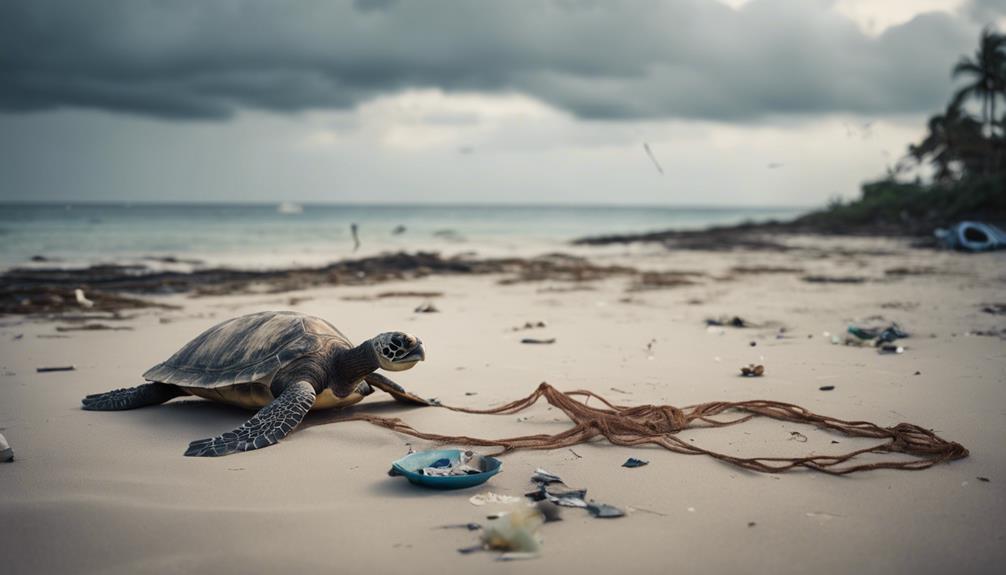
Zanzibar's long history of sea turtle consumption has spawned a deadly crisis, with recurring incidents of chelonitoxism claiming lives and prompting urgent calls for change. The recent incident on Pemba Island, where 8 children and 1 adult died from eating sea turtle meat, highlights the ongoing crisis surrounding sea turtle consumption. Despite warnings from authorities, sea turtle meat continues to be considered a delicacy in Zanzibar, leading to recurring cases of chelonitoxism.
| Year | Incident | Deaths |
|---|---|---|
| 2021 | Sea turtle meat consumption | Multiple |
| 2024 | Sea turtle meat consumption | Multiple |
| 2024 | Pemba Island incident | 8 children, 1 adult |
The history of poisonings in Zanzibar underscores the persistent risks associated with consuming sea turtles, emphasizing the need for heightened caution and prevention measures. Zanzibar authorities have been prompted to raise public awareness about the dangers of sea turtle consumption, as the tragic outcomes of such incidents continue to occur. Chelonitoxism, a form of poisoning caused by eating sea turtles, can cause neurologic manifestations, and even death. It is vital to address this crisis through awareness and education, to prevent further tragedies.
Health Risks of Seafood Consumption
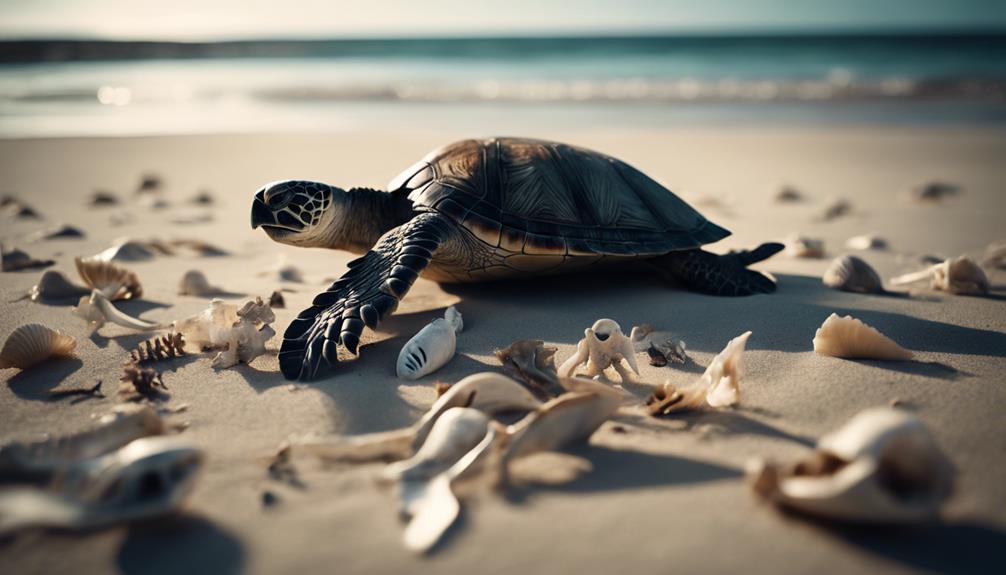
Consuming sea turtle meat poses significant health risks, including the threat of foodborne illnesses and toxic chemical exposure.
In Zanzibar, where sea turtle meat is often consumed, the risk of chelonitoxism, a rare and potentially deadly food poisoning, is particularly high.
Moreover, the lack of an antidote for chelonitoxism underscores the importance of acknowledging the dangers associated with seafood consumption.
Foodborne Illness Risks
How can a delicacy like sea turtle meat, prized by many in Zanzibar, pose such a significant threat to human health, particularly when it comes to foodborne illness risks? The answer lies in the rare but deadly food poisoning known as chelonitoxism, which has claimed the lives of 8 children and 1 adult in Zanzibar.
Sea turtle meat, considered a delicacy in Zanzibar, can cause severe symptoms ranging from mild nausea to severe neurological issues, with no known antidote available for treatment. Children and pets are particularly vulnerable to chelonitoxism, making them at higher risk of severe illness or death.
The recent fatalities highlight the urgent need for public awareness about the dangers of consuming sea turtle meat. Previous incidents in Zanzibar, including fatalities in 2021, demonstrate the severity of chelonitoxism and the importance of education on foodborne illness risks.
It's essential to raise public awareness about the risks associated with consuming sea turtle meat to prevent further fatalities.
Toxic Chemical Exposure
As the dangers of consuming sea turtle meat are multifaceted, another significant threat emerges in the form of toxic chemical exposure, which can have devastating health consequences for those who eat seafood contaminated with pollutants. In Zanzibar, where sea turtle meat is considered a delicacy, the risks of toxic exposure are particularly high.
Chelonitoxism, a rare food poisoning caused by consuming contaminated sea turtle meat, can lead to severe neurological symptoms and even fatalities. The recent tragedy, which claimed the lives of 8 children and 1 adult, serves as a stark warning of the urgent need to avoid consuming sea turtles.
Authorities in Zanzibar have issued warnings, urging people to refrain from eating sea turtle meat to prevent further tragedies. The risks of toxic exposure from contaminated seafood are very real, and it's essential to take heed of these warnings to avoid devastating health consequences.
Warning Signs Ignored
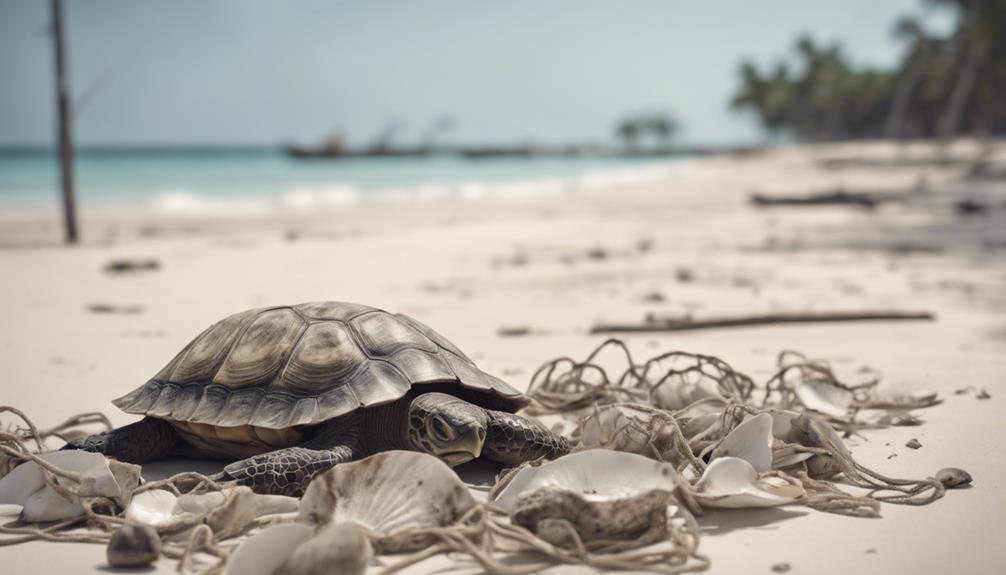
Despite repeated warnings and previous incidents, Zanzibar's public continued to disregard the risks, indulging in sea turtle meat with devastating consequences. The authorities had previously banned the consumption of sea turtles after fatalities, but the ban was disregarded. The tragic outcome of 8 children and 1 adult dying highlights the dangers of ignoring warning signs. This incident serves as a stark reminder of the severe consequences of consuming sea turtle meat contaminated with toxic chemicals.
| Incident | Warning Signs | Consequences |
|---|---|---|
| Sea turtle meat consumption | Authorities' ban, previous fatalities | 8 children, 1 adult died |
| Ignoring warnings | Lack of compliance, public disregard | Fatalities, food poisoning |
| Toxic chemical exposure | Official warnings, health risks | Devastating consequences, fatalities |
| Sea turtle meat ban | Authorities' ban, previous incidents | Public disregard, fatalities |
| Fatalities | Warning signs ignored, lack of compliance | 9 fatalities, devastating consequences |
The lack of compliance with official warnings led to devastating results, emphasizing the need for public adherence to safety regulations. The dangers of eating turtle meat are evident, and it is essential for people to understand the risks involved.
A Preventable Tragedy Unfolds
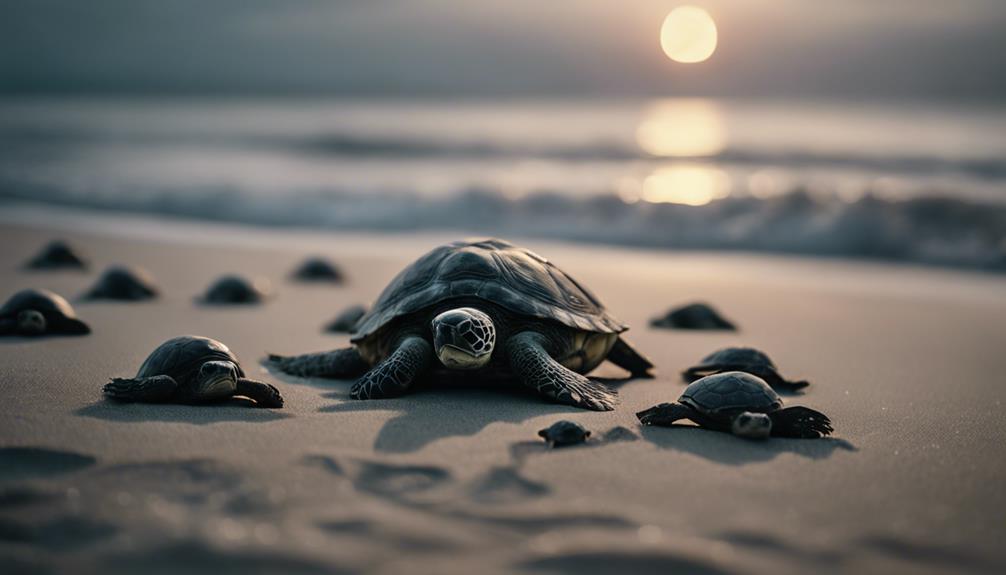
On Pemba Island, Zanzibar, a devastating tragedy unfolded when 8 children and 1 adult lost their lives after consuming contaminated sea turtle meat. The cause of these fatalities was identified as Chelonitoxism, a rare form of food poisoning associated with consuming sea turtles. Laboratory tests confirmed that all victims had ingested contaminated sea turtle meat, leading to their deaths.
This incident highlights the severe consequences of consuming sea turtles, despite being considered a delicacy in Zanzibar. The tragedy is a stark reminder of the dangers associated with eating sea turtle meat, which can lead to fatal cases of food poisoning. Authorities in Zanzibar have issued urgent warnings against consuming sea turtles to prevent future tragedies like this one.
This preventable tragedy serves as a warning to the community, emphasizing the importance of avoiding sea turtle meat to prevent further fatalities. By understanding the risks associated with consuming sea turtles, the community can take necessary precautions to avoid similar tragedies in the future.
Frequently Asked Questions
How Many People Died in Zanzibar Sea Turtle Meat?
According to reports, a total of 16 people have died in Zanzibar after consuming sea turtle meat.
In a recent incident, 8 children and 1 adult lost their lives after eating contaminated turtle meat on Pemba Island.
This tragedy follows a similar incident in November 2021, where 7 individuals, including a 3-year-old, died from eating turtle meat on the same island.
Is Turtle Meat Poisonous in Zanzibar?
In Zanzibar, a staggering 80% of sea turtle meat consumers experience chelonitoxism, a rare and potent food poisoning. Turtle meat is indeed poisonous in Zanzibar, causing symptoms ranging from nausea to severe neurological issues.
Despite warnings from authorities, the delicacy remains popular, resulting in tragic incidents like the recent fatalities. The toxic nature of sea turtle meat consumption can't be overstated, making it vital to exercise extreme caution.
Has Anyone Died From Eating Sea Turtle Meat?
Yes, people have died from eating sea turtle meat. In fact, several incidents have been reported in Zanzibar, including a recent case where 8 children and 1 adult lost their lives after consuming contaminated sea turtle meat.
This highlights the deadly consequences of eating sea turtle meat, which can cause a rare food poisoning called chelonitoxism.
Why Is Eating Sea Turtles Deadly?
Some might assume that eating sea turtles is harmless, but the truth is that it can be deadly. Chelonitoxism, a rare form of food poisoning, is caused by consuming contaminated sea turtle meat. This can lead to severe neurological issues and even death, with no known antidote available.
The toxic effects can affect various body systems, making it a dangerous condition that's particularly risky for children and pets.
Conclusion
As the sun sets on Zanzibar's shores, the allure of sea turtle meat proves to be a siren's call, luring victims to their demise. Like the mythical sirens of old, this deadly delicacy beckons with its flavor, only to dash hopes on the rocks of tragedy. Eight children and one adult have fallen prey to the silent killer, Chelonitoxism, a grim reminder that the price of indulgence can be devastating.
As the curtain falls on this preventable tragedy, the warning signs remain, a haunting reminder of the importance of responsible seafood consumption.

